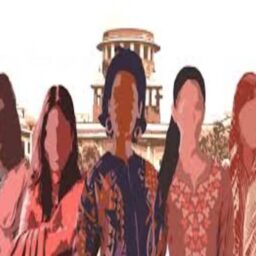Facts[1]
Ms Githa Hariharan, the petitioner, married Dr Mohan Ram in 1982 and a son named Rishab was born to them in July 1984. They applied for a 9% Relief Bond to the Reserve Bank of India in the name of their minor son, Rishab. The petitioner sent an intimation that she, in the capacity of a mother would act as the natural guardian of the child for investment. The Authorities of the Reserve Bank of India sent the application back recommending her to produce the application signed by the father as he is the natural guardian or in the alternative, the bank asked to produce a certificate of guardianship signed in her name by the competent authority. The Reserve Bank of India informed that the father would be the natural guardian as per section 6 (a)[2] of the Hindu Minority and Guardianship Act (HGMA), 1956.
The case of Githa Hariharan and another v. Reserve Bank and another was heard along with the case Vandana Shiva v. Jayanta Bandhopadhaya[3]. Chief Justice A. S. Anand presided over the bench in 1999. Judgement passed under Hindu Law stated that “the mother is also the guardian of her minor children along with the father.”[4]
The case of Vandana Shiva v. Jayanta Bandhopadhaya centres around prayer for the custody of the minor son born through the lawful wedlock between the husband and the wife. The husband instituted divorce proceedings against the wife, which was pending before the District Court of Delhi. In the same proceeding, the husband prayed for the custody of his minor son. In addition, the father stated that no decision should be made without his permission as he was the only natural guardian of the minor. Coincidentally, the minor was staying with the mother. The mother filed an application for maintenance. The father was not interested in the welfare and benefit of the child, without discharging any corresponding obligation, the father claimed the right to be a natural guardian. The father moved to the honourable court under Article 32 of the Indian Constitution praying for the declaration of section 6 (a) of the Hindu Minority and Guardianship Act, 1956 which states that the natural guardian of a Hindu minor is a father and after him, the mother, read with section 19 (b) of the Guardians and Wards Act, 1890 i.e. guardian not be appointed by the court in certain cases[5], under the light of Article 14 and 15 of the Indian Constitution as unconstitutional. The mother filed a writ petition challenging Section 6(a)[6] and Section 19(b) of the Guardians and Wards Act, 1890, as these sections violate article 14 and article 15 of the Indian Constitution. The main issue in both the above-cited cases is related to guardianship of a minor child due to which both cases were heard together.
Issues Raised
Githa Hariharan challenged the constitutional validity of the provision given in section 6(a) of the Hindu Minority and Guardianship Act (HGMA), 1956, in the Supreme Court on grounds that it violated the Right to Equality and Prohibition of Discrimination guaranteed under Article 14 and Article 15 of the Indian Constitution. According to section 6 (a) of the Hindu Minority and Guardianship Act (HGMA), 1956: Concerning the minor’s person and property, for a boy or an unmarried girl, the father will act as the natural guardian and after him the mother. Minor children below the age of five years shall reside with the mother.[7] According to Article 14 of the Indian Constitution, no person can be denied equality before the law or equal protection of laws within the territory of the country.[8] Article 15 of the Indian Constitutions ensures Prohibition of discrimination on various grounds such as gender, caste, colour, etc. against the citizens of the country. This ensures prohibition of discrimination concerning access and use of hotels, shops, transport facilities, wells, resorts, etc. The article states that nothing shall prevent from making special provisions for the upliftment of women, children, socially and educationally backward classes of citizens.[9]
Arguments
The constitutional validity of the provision mentioned in section 6 (a) of the Hindu Minority and Guardianship Act, 1956 was challenged in the Supreme Court on grounds that the above-stated provision violated the Right to Equality and Prohibition of Discrimination guaranteed under Article 14 and Article 15 of the Indian Constitution.
The petitioner argued that the disclosure from the Reserve Bank of India was arbitrary and opposed to the basic concept of justice given in the Constitution of India. Thereby, challenging the validity of Section 6 (a) of the Hindu Minority and Guardianship Act, 1956. It was also argued that the provision is discriminatory in nature and keeps women at disadvantage concerning matters related to their children.
Decision
Relying on the principles of Gender Equality consecrated in the Constitution of India, The Supreme Court deciphered the word “after” in the provision given under Section 6 (a) of the Hindu Minority and Guardianship Act, 1956 and its constitutional validity was upheld. It was held that the father and mother, both are the natural guardians of a minor Hindu child, and the mother is not the natural guardian only after the death of the father as that would be discriminatory not only to the mother but also against the welfare of the child.[10]
Importance
This is one of the landmark judgements in Indian Legal history concerning guardianship related matters. This judgement interpreted and established that under Section 6(a) of the Hindu Marriage and Guardianship Act, 1956, the word “after” given in the provision does not mean that mother is the guardian of the minor child only after the passing away of the father, it means that a natural guardian can be both a mother and father, whoever takes care of the welfare of the child and is interested in the benefit of the child.
Author(s) Name: Rossel Aggarwal (Army Institute of Law, Mohali)
References:
[1] AIR 1999, 2 SCC 228
[2] Hindu Minority and Guardianship Act (HGMA), 1956
[3] Vandana Shiva v. Jayanta Bandhopadhaya, W. P.(C) No. 1016/1191
[4] https://githahariharan.com/?page_id=289
[5] https://legislative.gov.in/sites/default/files/A1890-8.pdf
[6] Hindu Minority and Guardianship Act, 1956, section 6 (a)
[7] https://legislative.gov.in/sites/default/files/A1956-32_0.pdf
[8] https://legislative.gov.in/sites/default/files/COI_1.pdf
[9] https://legislative.gov.in/sites/default/files/COI_1.pdf














